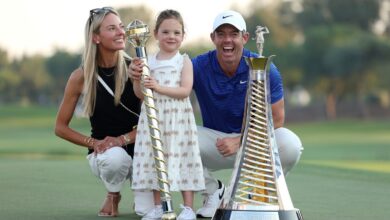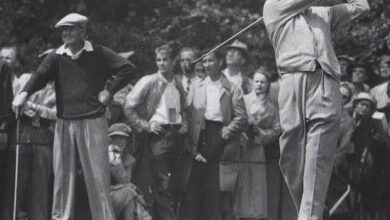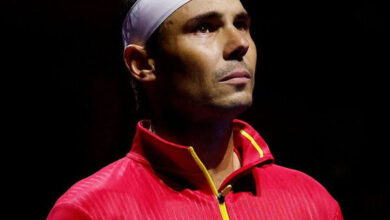‘Never experienced anything like this’: Jordan Spieth at troubling crossroads
As is the case with Rory McIlroy’s next major win, Jordan Spieth’s next win of any kind feels close — yet so far away.

Spieth’s last PGA Tour victory came 28 months ago at the RBC Heritage at Harbour Town. The two-plus years since have been marked by highs (T4 at the 2023 Masters; another near-win at the RBC; his usual short-game wizardry); lows (14 missed cuts and a disqualification); swing changes (his face is far more shut at the top than it was in his 2015 prime, an adjustment Brandel Chamblee said in January was “one of the more baffling things I think I’ve seen since I’ve been sitting in this chair for 20 years”); and, perhaps most impactfully, nagging issues with his left arm and wrist that he has been fighting to varying degrees since he chipped a bone in his left hand in 2018, an injury that he later admitted he’d never properly addressed.
For years, Spieth didn’t speak much of his condition; he was reluctant to use it as an excuse. But over time the complications that came with it became impossible to ignore. In May 2023, Spieth withdrew from the Byron Nelson, in his hometown of Dallas, citing acute pain in his left wrist. He played in the PGA Championship at Oak Hill a week later but still wasn’t right.
In October of that year, in the wake of the Ryder Cup, Spieth reaggravated his wrist again while lifting a toaster at his home. “I wasn’t doing anything either time that I hurt it that should have caused what happened,” Spieth said the following month of the two flare-ups. After several tests, doctors diagnosed him with ulnar nerve damage. At long last, some medical clarity. “It makes me think, staying on top of this I can get to structurally doing what I need to be doing to be at my best,” Spieth said then.
Spieth spent the off-season trying to heal, undergoing physical therapy up to four times a week. At the first event of the 2024 season, The Sentry, Spieth was asked how his wrist was feeling. “It’s good,” he said. “It’s not so much the wrist, it’s kind of up in the arm and managing that. The wrist was kind of just what took the fall from some ulnar nerve stuff.” He added, “I would say from December on it’s been really solid, I’ve been on the right path.”
And yet the wrist continued to trouble him — and his game.
After a promising start to the season (3rd in Maui, T6 in Phoenix), Spieth began to struggle, missing cuts at the Players, Valspar and Masters. A week after the Masters, at the RBC, Spieth described his injury to the AP as “a come-and-go thing,” adding, “I could oddly enough twist in the wrong way getting off the ground, and I couldn’t play tomorrow. But I could play the next day.” He added, “the ulnar side of the wrist is hard to heal.”
In Spieth’s 11 starts since the Masters, he hasn’t registered a single top-20 finish. He has dropped to 39th in the world and 63rd in the 2024 FedEx Cup standings, as this week he prepares to play in the final regular-season event of the year, the Wyndham Championship, in Greensboro, N.C. Spieth is mathematically guaranteed a spot in the FedEx top 70 that will advance to the first round of playoffs in Memphis, but he will need a strong finish there to climb into the top 50 who get through to the second playoff event, the BMW Championship, and punch their tickets into next season’s Signature Events. For a player who won three majors before he turned 24, Spieth has much at stake over the next two weeks.
“It’s not hurting,” Spieth, now 31, said Tuesday in Greensboro when asked about his wrist, “but subconsciously it’s hard not to look at the numbers and think this isn’t a coincidence.”
Spieth’s driving has been excellent this season — he’s 14th on Tour in SG: Off-the-Tee — but the rest of his stats paint a much grimmer picture. He’s 80th in SG: Putting; 88th in SG: Around the Green (a category in which he usually shines); and a dreadful 119th in SG: Approach the Green. “It’s been a frustrating year because it’s been maybe my best driving year ever, and then the clubs that I make the most impact into the ground with, which normally are my bread and butter, have been pretty off,” he said.
Spieth’s pal Smylie Kaufman, an analyst for NBC Sports, has a theory that perhaps Spieth’s pursuit of more distance has had a detrimental impact on his iron game. “When you make swing changes, you start hitting it further,” Kaufman said recently on GOLF’s Subpar. “Sometimes there’s a driver swing the guys have and sometimes there’s an iron swing the guys have. And I think he’s kind of caught a little bit in between.”
Meanwhile, Spieth’s quest for more answers about his wrist continues. More tests. More scans. More consultations with doctors. All of which has led him to the conclusion, he said, that he’ll likely to have to take some kind of surgical action this off-season. Between now and then, he said, “I’m going to pretend nothing’s happening, fully trust it, given that I’ll be able to get it fixed.” Spieth said he’s not sure yet “exactly what I’ll do and where I’ll do it, but unfortunately something kind of has to get done. And I’ve never experienced anything like this before.”
That’s the mysterious thing about his injury: It rarely acts up when he’s playing or practicing, he said. “It’s all off the golf course — weird little things where my tendon will kind of pop out, sublux or dislocate out of the groove and then I’ve got to get it back in or else I wouldn’t be able to grip a club,” he said.
He added, “I’m pain-free until it subluxes, and then I’m in very much pain until I get it back.“
And those unsettling moments, he said, occur every week or two.
Even if the tendon doesn’t bother him on the course, though, isn’t it plausible that the anticipation of the injury flaring up could subconsciously affect him? Spieth didn’t write off the possibility but also couldn’t comment with any certainty. “It’s too tough to measure if or if it’s not making a difference,” he said.
All Spieth can do now is play hard for the next two weeks, which, he’s hopeful, will lead to a second playoff start followed by a third at the Tour Championship. Then he can turn his attention back to getting his body right.
“I like to think hopefully I have 10 to 15 years of prime and some of my best golf left,” he said, “so I’ll be optimistic about the process.”



